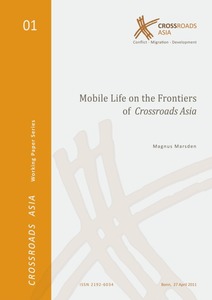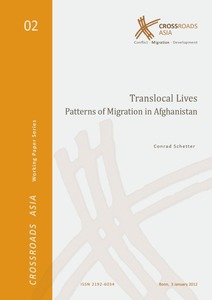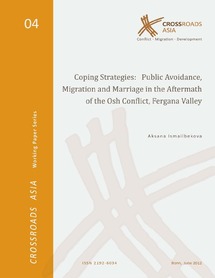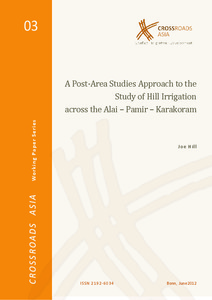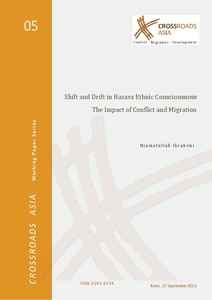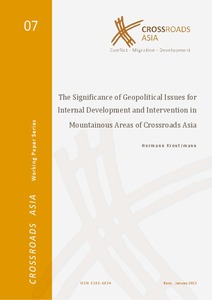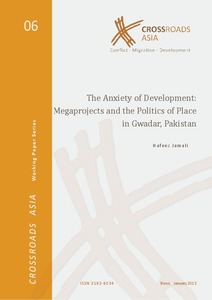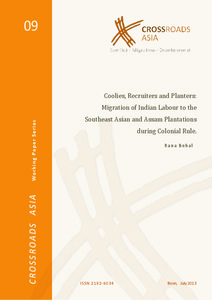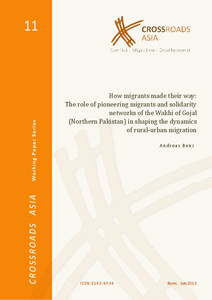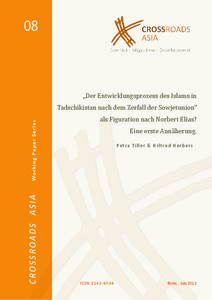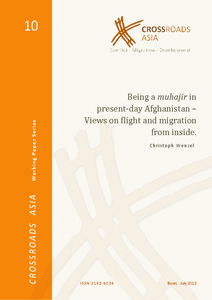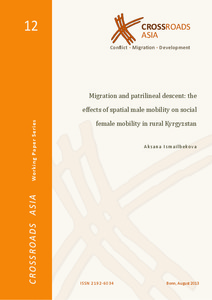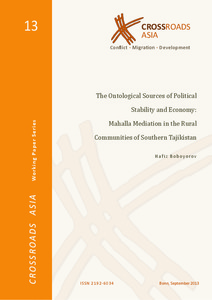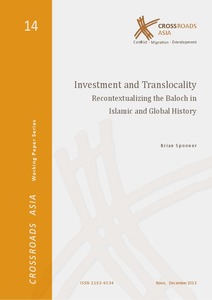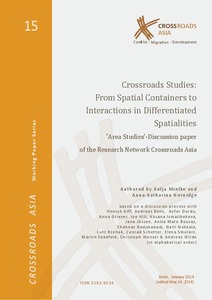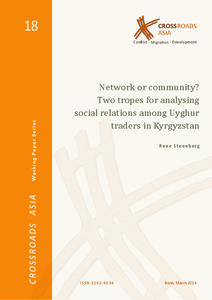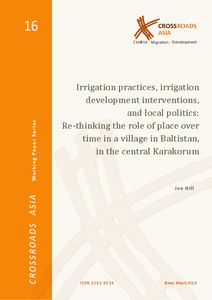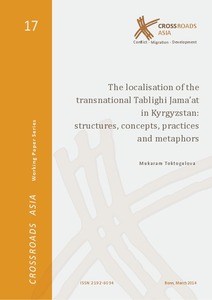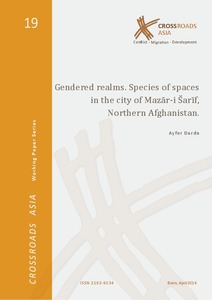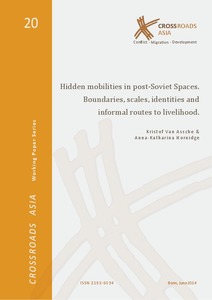Browsing Crossroads Asia Working Paper Series by Issue Date
Now showing items 1-20 of 37
-
Mobile Life on the Frontiers of Crossroads Asia
Marsden, Magnus (2011-04-27)In what ways do Chitralis and the wider region’s inhabitants themselves perceive, act within and seek to understand this geo-politically divided and culturally discontinuous space? I want to explore these questions ... -
Translocal Lives: Patterns of Migration in Afghanistan
Schetter, Conrad (2012-01-03)We generally associate civil wars with flows of refugees. We tend to give much less consideration to the way in which patterns of migration that arise as a result of violent conflicts, especially long-lasting ones, take ... -
Coping Strategies: Public Avoidance, Migration, and Marriage in the Aftermath of the Osh Conflict, Fergana Valley
Ismailbekova, Aksana (2012-06)This paper examines the changing survival strategies of Uzbeks in the aftermath of mass violent conflict in Osh in June 2010. After the riots, Osh Uzbeks were exposed to many difficulties. The Kyrgyz government used economic ... -
A Post‐Area Studies Approach to the Study of Hill Irrigation across the Alai – Pamir – Karakoram – Himalaya
Hill, Joe (2012-06)Due to the geo-political history of the mountainous region stretching from the Alai in the south of Kyrgyzstan to the north-western Himalaya of India, language barriers, and also perhaps the nature of traditional area ... -
Shift and Drift in Hazara Ethnic Consciousness: The Impact of Conflict and Migration
Ibrahimi, Niamatullah (2012-09-27)The paper argues that ethnicity and ethnic consciousness among the Hazaras is inexorably linked with the emergence of the Afghan state in the end of the nineteenth century and the crisis and instability that it has gone ... -
The Significance of Geopolitical Issues for Internal Development and Intervention in Mountainous Areas of Crossroads Asia
Kreutzmann, Hermann (2013-01)This working paper illustrates the process of territorial transformation in time and space. From the period of Silk Road networks to imperial designs for spatial control in Crossroads Asia, external interests for local and ... -
The Anxiety of Development: Megaprojects and the Politics of Place in Gwadar, Pakistan
Jamali, Hafeez A. (2013-01)This working paper explores the social geography of anticipation, desire, exclusion, and control that has emerged as a result of Baloch fishermen’s entanglement with the Pakistani government’s plans to develop a large ... -
Coolies, Recruiters and Planters: Migration of Indian Labour to the Southeast Asian and Assam Plantations during Colonial Rule
Rana, Behal (2013-07)This paper attempts to tell the story of marginalized agrarian communities, who were economically depressed as a consequence of colonial land revenue policies and became the hunting ground for recruitment and transportation ... -
How migrants made their way: The role of pioneering migrants and solidarity networks of the Wakhi of Gojal (Northern Pakistan) in shaping the dynamics of rural-urban migration
Benz, Andreas (2013-07)In this working paper, I investigate the role which solidarity networks based on different types of shared identities, perceived relatedness and kinship affiliations played for enabling, shaping, facilitating and intensifying ... -
„Der Entwicklungsprozess des Islams in Tadschikistan nach dem Zerfall der Sowjetunion“ als Figuration nach Norbert Elias?: Eine erste Annäherung
Tiller, Petra; Herbers, Hiltrud (2013-07)In 70 Jahren sowjetischer Herrschaft waren die Muslime Zentralasiens fast vollständig von ihren Glaubensbrüdern abgeschnitten. Durch die atheistisch-ideologischen Repressionen waren die Menschen gezwungen, ihren Glauben ... -
Being a muhajir in present-day Afghanistan – Views on flight and migration from inside
Wenzel, Christoph (2013-07)In this paper I focus on the internal discourse of those Afghans who are refugees within their country today. I want to show how the use of a certain vocabulary is crucial for the creation of particular perspectives on ... -
Migration and patrilineal descent: the effects of spatial male mobility on social female mobility in rural Kyrgyzstan
Ismailbekova, Aksana (2013-08)Migration processes in Kyrgyzstan have given rise to fundamental social and demographic changes with the result that many villages and town quarters are nowadays inhabited solely by women, children and the elderly, whereas ... -
The Ontological Sources of Political Stability and Economy: Mahalla Mediation in the Rural Communities of Southern Tajikistan
Boboyorov, Hafiz (2013-09)For the sake of a modest contribution to Crossroads Studies, this article argues that state and society in Tajikistan is embedded into personal (kinship, patron-client, etc.) networks of people. These networks structure ... -
Investment and Translocality: Recontextualizing the Baloch in Islamic and Global History
Spooner, Brian (2013-12)The Baloch are one of the best documented ethnic communities in the modern Islamic world. But the information comes from non-Baloch, who saw them as a tribal population, with their own history and culture, separate from ... -
Crossroads Studies: From Spatial Containers to Interactions in Differentiated Spatialities
Mielke, Katja; Hornidge, Anna-Katharina (2014-01)This paper, a little less than three years after indulging into this process, aims to facilitate the process of discussion in the network and shall be read as a thought-piece based on the joint reflections of members of ... -
Network or Community? Two tropes for analysing social relations among Uyghur traders in Kyrgyzstan
Steenberg, Rune (2014-03)This article focuses on Uyghur traders from rural Atush trading in southern Kyrgyzstan, more precisely in Kadamjay in Batken. People from Atush are known to be especially gifted in trade across all of Xinjiang and Central ... -
The localisation of the transnational Tablighi Jama’at in Kyrgyzstan: structures, concepts, practices and metaphors
Toktogulova, Mukaram (2014-03)The transnational Tablighi Jama’at (TJ), which emerged and expanded outward from India and Pakistan in the early and mid-twentieth century, started to extend its missionary activities into Central Asia in the course of the ... -
Gendered realms: Species of spaces in the city of Mazār-i Šarīf, Northern Afghanistan
Durdu, Ayfer (2014-04)This paper is an attempt at an inventory — alas, certainly not as poetic as Perec's. A number of distinctive spaces in urban Mazār-i Šarīf are described, each of which is deeply affected by gender divides. The inquiry ... -
Hidden mobilities in post-Soviet Spaces: Boundaries, scales, identities and informal routes to livelihood
Van Assche, Kristof; Hornidge, Anna-Katharina (2014-06)We analyze the hidden mobilities, in physio-spatial, epistemic and social terms that are part and parcel of livelihood strategies in places dominated by informal institutions and authoritarian governance regimes. Soviet ...


